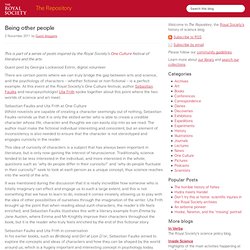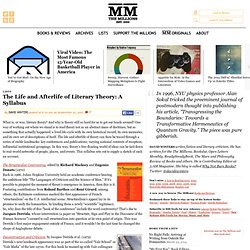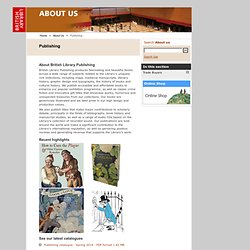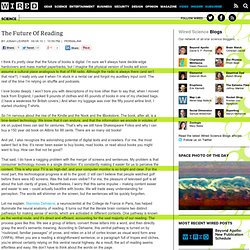

The ragbag - facebook for the characters of 19th century... The Subconscious Shelf. Groucho Marx and T.S. Eliot Were Pen Pals - Entertainment. Lee Siegel commemorates a new volume of T.S.

Eliot's collected letters by noting a series of exchanges that aren't included in the book: the missive exchanged by Eliot and Groucho Marx, two sharply different men fascinated with each other. The letters began in the early 1960s, Siegel writes for The Economist's More Intelligent Life, and began with a simple request.
Eliot wrote to Groucho, asking for a headshot. Being other people. This is part of a series of posts inspired by the Royal Society’s One Culture festival of literature and the arts.

Guest post by Georgia Lockwood Estrin, digital volunteer There are certain points where we can truly bridge the gap between arts and science, and the psychology of characters – whether fictional or non-fictional – is a perfect example. At this event at the Royal Society’s One Culture festival, author Sebastian Faulks and neuropsychologist Uta Frith spoke together about this point where the two worlds of science and art meet. Whilst novelists are capable of creating a character seemingly out of nothing, Sebastian Faulks reminds us that it is only the skilled writer who is able to create a credible character whose life, character and thoughts we can easily slip into as we read.
Physics from Hell: How Dante’s Inferno Inspired Galileo’s Physics. The Anatomy of Influence: Mapping the Labyrinth of Literature. The Life and Afterlife of Literary Theory: A Syllabus. What is, or was, literary theory?

Monty Python's Terry Jones crowdsources funding for book. "Traditional publishing is in the doldrums, it's collapsing.

Publishers are looking around for new ways of going forward. I think Unbound could be the future," says author and Monty Python member Terry Jones -- the first author to gain funds for a book through a new crowdsourcing platform. Described as acrowd-funded Kickstarter-like project for books, Unbound launched in May. Since then, six novels have been put up on the website -- each accompanied by a video curated by the author explaining more about their tome and why the public should invest in its creation. Jones' book, Evil Machines, is the first to reach the target set by the Unbound team and is set for publication in November. And a lot more book proposals are going to appear soon -- with Kieran hinting that we can expect some big names -- as well as first time authors hoping to forge a name for themselves. But could this crowdsourcing model replace traditional publishing? Are you an author in the making? British Library Publishing. About British Library Publishing British Library Publishing produces fascinating and beautiful books across a wide range of subjects related to the Library’s uniquely rich collections, including maps, medieval manuscripts, literary history, graphic design and typography, the history of books and cultural history.

We publish accessible and affordable books to enhance our popular exhibition programme, as well as classic crime fiction and innovative gift titles that showcase quirky, humorous and unexpected treasures from our collections. Our books are generously illustrated and we take pride in our high design and production values. We also publish titles that make major contributions to scholarly debate, principally in the fields of bibliography, book history and manuscript studies, as well as a range of audio CDs based on the Library’s collection of recorded sound. Recent highlights See our latest catalogues Publishing catalogue - Spring 2014 - PDF format 1.62 MB Contact us.
Sources. Poetry. Prose. Drama. The Future Of Reading. I think it’s pretty clear that the future of books is digital.

I’m sure we’ll always have deckle-edge hardcovers and mass market paperbacks, but I imagine the physical version of books will soon assume a cultural place analogous to that of FM radio. Although the radio is always there (and isn’t that nice?) , I really only use it when I’m stuck in a rental car and forgot my auxilliary input cord. The rest of the time I’m relying on shuffle and podcasts. I love books deeply. Erich Auerbach.
Erich Auerbach (November 9, 1892 – October 13, 1957) was a philologist and comparative scholar and critic of literature.

His best-known work is Mimesis: The Representation of Reality in Western Literature, a history of representation in Western literature from ancient to modern times and frequently cited as a classic in the study of realism in literature.[1] Biography[edit] He moved to the United States in 1947, teaching at Pennsylvania State University and then working at the Institute for Advanced Study. He was appointed professor of Romance philology at Yale University in 1950, a position he held until his death in 1957 in Wallingford, Connecticut.[4] While at Yale, Auerbach supervised Fredric Jameson's doctoral work.[5] Works[edit] Auerbach, Erich. References[edit] Jump up ^ Greenberg, Mark L. (1992). Bibliography Bakker, Egbert. External links[edit] Sebastian Sobecki (2006). A Little Aloud - Vintage Books. We are on the cusp of a reading revolution. Increasingly, research is uncovering an intimate connection between reading and wellbeing.
The seemingly simple act of being read to brings remarkable health and happiness benefits. Margaret Atwood: Year of the Flood.